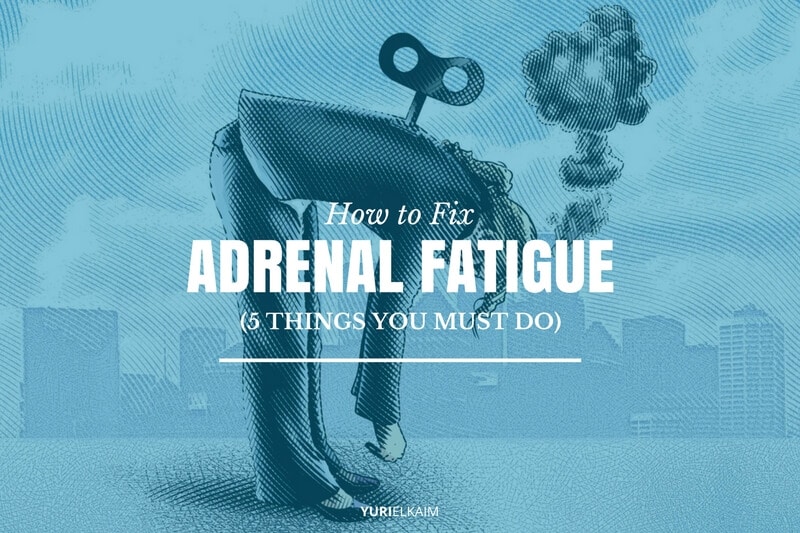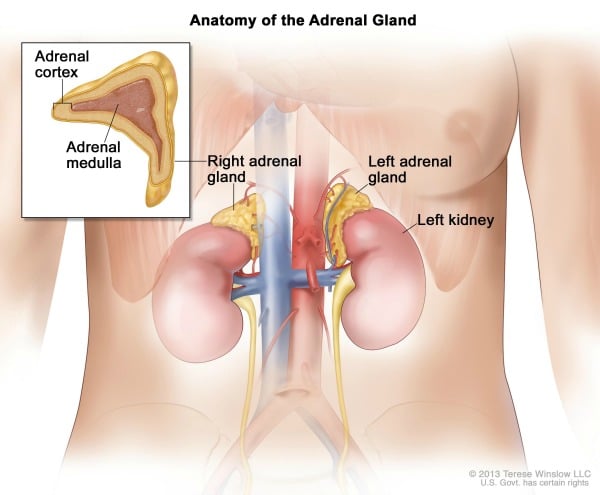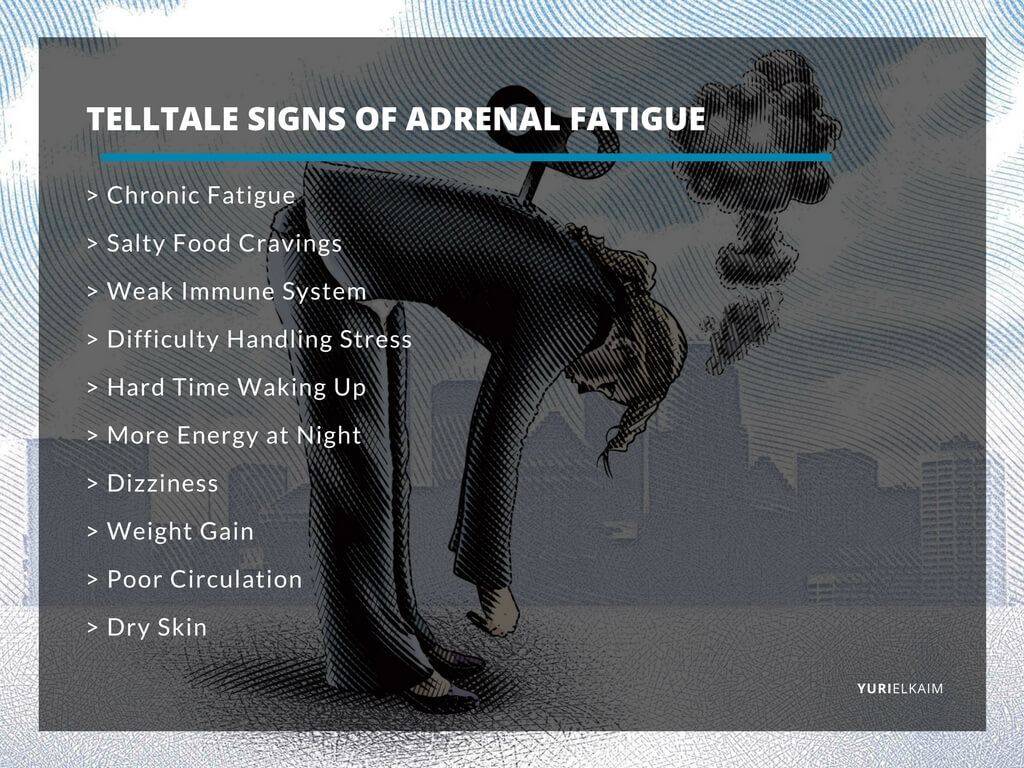In this article
Imagine your body is a car.
In the morning, you get in, start it up, and begin driving – only to notice that the gas tank is almost empty. Instead of cruising to your destination, you’re left sputtering along, hoping and praying desperately that it won’t run dry before your day is over.
Worst of all, when you wake up the next morning anticipating a full gas tank (or a well-rested body after an evening of sleep), you’re left disappointed.
No matter what, your “gas tank” – or reservoir of energy – never seems to get completely full.
This is a little bit like how it feels when you suffer from adrenal fatigue.
Constant fatigue and the feeling of being drained, overwhelmed, and stressed out are just a few hallmark symptoms that come when your body’s gas tank runs dry.
Our body depends on a few important hormones to give us energy and keep our engines running smoothly. When these hormones aren’t being produced the way they’re supposed to or in adequate amounts, it can leave us feeling tired, worn out, and empty.
The Answer Lies in the Adrenal Glands
Source: National Cancer Institute
These endocrine glands sit right above the kidneys and are responsible for pumping out the hormones that we need to survive and function every single day, including cortisol – and a few sex hormones too (1).
Cortisol, in particular, is a critical hormone affected by adrenal function. Cortisol is what helps you respond to stress normally and in a healthy way. Not only that, but it also maintains blood sugar levels, regulates the metabolism of fats, proteins, and carbohydrates, and controls your immune responses.
So what can cause all those negative effects of adrenal fatigue?
There are several adrenal gland disorders that can diminish the function of the adrenal glands.
Genetic mutations can often be the culprit, as can tumors, chronic infections, or certain medications. Problems with other glands, like the pituitary gland, might also be to blame as they help regulate and control the adrenal glands.
Unfortunately, there’s a long list of symptoms you can expect to accompany any case of adrenal fatigue. If you’re wondering how to diagnose adrenal fatigue, checking how many of these common symptoms apply to you is a good place to start. Remember that adrenal fatigue affects everyone differently, but there are certain effects that many people can expect to experience.
Telltale Signs of Adrenal Exhaustion Include:
Chronic Fatigue
No matter how much sleep you get, adrenal fatigue causes a persistent plummet in daily energy levels. With the depletion of the adrenal glands, levels of important hormones like cortisol and other neurotransmitters drop, leading to constant feeling of fatigue and tiredness.
Salty Food Cravings
If you find yourself reaching for the chips, popcorn, and salty snacks constantly, it could be a sign that your adrenal glands aren’t working the way they’re supposed to. This is because the adrenal glands are responsible for producing aldosterone, a hormone that controls our excretion of fluids and minerals.
With a reduction in the amount of aldosterone produced, it causes us to urinate more and excrete more minerals in the urine, which can cause a craving for salty foods.
Weak Immune System
Adrenal fatigue has a big impact on cortisol levels, which can cause a serious decline in the function of the immune system.
This is because cortisol has an anti-inflammatory effect and is responsible for regulating the function of the immune system. With less cortisol in the body, our immune system isn’t able to work the way it should, opening the door for infections and illness.
Difficulty Handling Stress
When stress starts to build up, we depend on hormones like cortisol, norepinephrine, and adrenaline to help our body deal with it. So when your adrenal glands aren’t producing enough of these hormones, it can make even the smallest stressors seem overwhelming.
Other Common Symptoms:
- Difficulty waking up in the morning, regardless of how much sleep you’ve gotten
- Dizziness
- Having higher energy levels at night
- Overuse or dependence on stimulants like caffeine or sugar
- Weight gain
- Dry skin
- Poor circulation
If you found yourself nodding and thinking, “wow, that sounds like me” as you were reading through the list of symptoms, there’s a good chance you could be suffering from adrenal fatigue.
But don’t worry! There are ways to fix adrenal fatigue and get your adrenals working the way they’re supposed to again so that that long list of side effects will be a thing of the past.
How to Fix Adrenal Fatigue
1. Add Adrenal-Friendly Nutrients
A good diet is key to restoring healthy adrenal glands and maintaining energy levels to last you all day long. There are several crucial nutrients that should be included in your diet if you’re looking to fix your adrenal fatigue.
Pantothenic acid, also known as vitamin B5, is important for promoting the production of cortisol. It can be found in avocados, shiitake mushrooms, and sweet potatoes.
Getting enough vitamin C (try this smoothie) is important to keep your adrenal glands from over-producing powerful stress hormones like epinephrine and norepinephrine. This can be found in pretty much any kind of citrus fruit, plus spinach, bell peppers, and cantaloupe.
Finally, adrenal stress can cause us to lose magnesium quickly, so it’s important that we include plenty of it in our diet. Get a few servings of dark leafy greens, nuts, seeds, and beans into your diet to make sure you’re meeting your needs.
2. Save Your Biggest Meal for Last
Crispy Chickpea Thai Quinoa Bowl
Have you heard the saying: “breakfast like a king, lunch like a prince, dinner like a pauper”?
Well, try doing the opposite.
It seems almost intuitive to eat your biggest meal in the morning so that you can burn it off, then decrease your intake throughout the day. This is one case where what seems logical isn’t always best, however.
In the case of adrenal fatigue and an all-day energy diet, it’s actually best to have your main meal at the end of the day.
This is because getting a good night of sleep is one of the best ways to treat adrenal fatigue. Following this pattern of eating naturally matches your body’s circadian rhythm and prevents hormone disruptions, helping to support healthy adrenal function.
How does it work?
Our cortisol levels are highest in the morning, which is what helps to keep us alert during the day. Eating carbohydrates can help dull the cortisol response, so saving your largest meal for the end of the day allows you to sleep better through the night while reestablishing healthy hormone levels and optimizing adrenal function.
Plus, our body takes about eight hours to convert food into glycogen, a form of energy that helps power us through the day. This conversion works best when you’re asleep, which is why it’s best to save your biggest meal for last. This means that as soon as you wake up, you’re energized and ready to begin the day.
3. Start Your Day Off (B)right
As tempting as it might be to wake up and stay in bed, lights off, for a while after waking up on the weekend, getting your day off to a bright start is one of the best things you can do when it comes to adrenal fatigue.
Getting exposure to at least 30 minutes of bright light within an hour of waking up is essential for starting your day on the right foot and maintaining energy levels all day long.
Sunlight is the easiest way to go, but it might not always be an option depending on the time of year. Special lamps are available for this very purpose and can be a good option for most people. Look for one that puts out at least 10,000 lux of light intensity and can provide direct light from above.
4. Try Meditation
Since your adrenal glands are so closely connected to your stress hormones, like cortisol, it makes sense that controlling and managing your stress levels is one of the best ways to minimize your side effects.
Though there are many different methods for keeping stress at bay, meditation is particularly effective. In a 2013 study looking at the effects of meditation on stress levels, researchers found that mindfulness meditation decreased serum cortisol and lowered stress in participants (2).
I recommend meditating post-workout or first thing in the morning for maximum effectiveness. Set a timer for ten minutes, get into a comfortable, upright position, and establish a steady breathing pattern of inhaling and exhaling deeply.
5. Clean Up Your Diet
In addition to getting a good amount of adrenal-friendly nutrients into your diet, it’s important to make sure the rest of your diet is balanced and health-promoting, too.
Common irritants like gluten and dairy can cause inflammation in the gut, which prevents our digestive tract from working the way it’s supposed to and digesting and excreting food properly. Cutting these foods out of your diet can optimize your digestion and absorption, which can bump up energy levels and keep our immune system strong.
I recommend maintaining a diet rich in whole foods, like fruits, vegetables (chlorophyll especially), protein, and gluten-free grains to help heal your adrenal glands and keep you symptom-free. Not only is it good for your adrenal glands, but it’s good for your overall health as well.
Fix the Fatigue
Even though the effects of adrenal fatigue can be devastating, there are options available to heal your adrenal gland once and for all.
And now that we’ve covered how to fix adrenal fatigue, you’re all set to start making a few changes in your routine and say goodbye to the sluggishness and stress for good.
Are You Tired of Being Tired?
You’re not alone. Millions of people suffer from fatigue. The good news is, there are some things you can do to refuel your body’s energy stores and start feeling like yourself again.
Want to learn more? Check out the All-Day Energy Diet book, which offers key tips on restoring your body to its natural, energetic state.
Click the banner below to more details!









